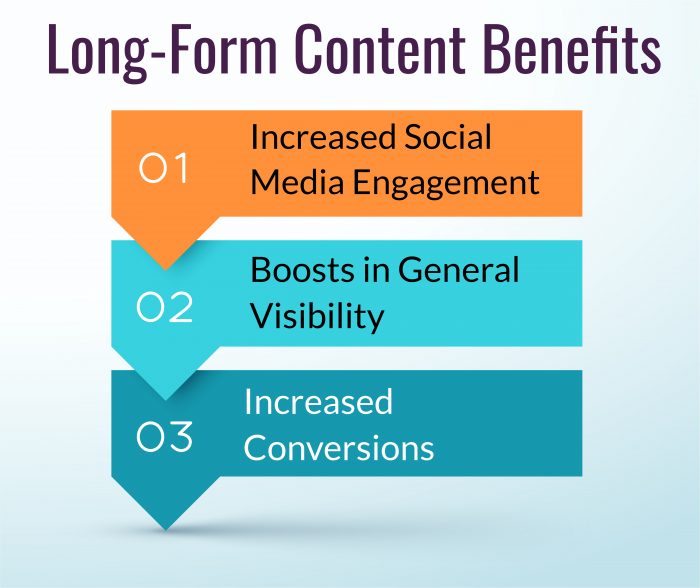The Ultimate SEO Guide To Long-Form Content

Long-form content combined with strategic keyword use on your site is the easiest way to quickly climb the search engine ladder. However, the average 500-700 word blog post isn’t considered “long-form” and may provide too little value. Fortunately, there’s no limit to how long your posts “should” be—it’s the quality of the content that matters. Here is Dallas SEO Dogs’ ultimate guide to implementing long-form content into your search engine optimization strategy.
What Is Long-Form Content?
Did you know that the average first-page result on Google contains 1,890 words? That’s long-form content, which is exactly what it sounds like: posts that go beyond the 500-word average into the 1,200+ range. Many leading businesses in their industries use long-form content as a way to prove their authority in the form of content such as:
- Ultimate Guides;
- Step-By-Step Tutorials; and
- In-Depth Analysis of a Complex Industry Topic.
Although there is a correlation between content length and search engine rankings, not every piece of longer content means that your site is going to skyrocket to the top of Google. However, with the knowledge of SEO and how to create long-form content on your side, your efforts could reap major benefits.

How Does Longer Content Support SEO?
SEO is all about proving to search engines and audiences that you are a respected authority in your industry. Original content that goes above and beyond the norm can help you not only increase your rankings but improve other aspects of your SEO strategy, including:
- General Visibility;
- Social Media Engagement;
- Link Building;
- Length of Site Visits; and
- Conversion Rates.
Imagine if you could meet all of these SEO needs through by simply making longer posts each month! There are several benefits to putting in the extra work on your site’s content.
1. Boost in Rankings and Authority
According to a study by BuzzSumo, there is actual proof that the average length of content among Google’s top 10 results is now longer than 2,000 words. Even Google itself says that exploring a broader topic with longer content is beneficial to businesses. Pandu Nayak, the creator of Google’s Panda algorithm says that while most users look to Google for quick answers, there is a growing number of users eager to find in-depth articles. With longer content, you can use more keywords and semantics throughout your prose that help reel in more readers and let Google know you’re the master of your industry. In a nutshell, long-form and relevant content ranks well, which leads to a higher level of visibility and an increase in industry authority. After all, if Google thinks your content is solid, why shouldn’t readers trust you to answer their questions?
2. Increased Social Engagement
You can write all the words you want, but they mean nothing if your target audience isn’t reading it! Social media combined with compelling content is the key to spreading your good word! Through an active social media account, you can quickly share your content. If it’s got the answers to what you already know your audience is searching for, it’s going to gain some buzz. Detailed articles are all the rage with audiences, so creating this form of content with relevance will get you farther.
3. Gather Up More Backlinks!
The more eyes that read your content means the higher the possibility for quality backlinks. If your page has a lot of great information on a topic, visitors are much more likely to share it on social media and link back to it from their own sites. These “backlinks” not only solidify your authority but also:
- Improve Your Google Organic Ranking;
- Create Faster Indexing; and
- Generate More Referral Traffic and Increased Conversions!

4. More On-Site Time
Your SEO efforts should include finding ways to keep your audience on your site pages longer. Great long-form content increases read time, which is a signal that your site is informative—and it positively impacts your rankings. If your content is well written and helpful to your audience, they won’t have a problem reading a blog that takes 7-10 minutes to get through. Also, with strategic internal linking throughout the content, you can help guarantee people will visit several pages of your site, ensuring higher on-site times. Not only is this great for conversions, but excellent content decreases your site’s bounce rates.
5. Increased Conversion Rates
Really, your content’s success boils down to how well it can boost conversions. With each passing year, people have less and less patience for boring, uninformative websites. Give them lots of great content and include strategic placement of calls-to-action (CTAs). Readers will learn quickly and more of them won’t leave without becoming customers.
Tips for Writing Great Long-Form Content
Now that you know why long-form content helps your SEO goals, where do you start? With a few quick steps and collaboration with your content team or digital marketing representative, you could have long-form content that creates conversions in no time. Here are some quick tips to get you started.
Define Your Goals
Don’t just jump onto a computer and start writing! Make a plan and keep the overall finish line in mind. A clear understanding of your goals will help keep longer content on track with your long-term content goals. Some points to keep in mind include:
- Who you are writing the content for;
- What the point of the content is (such as leads, email lists, general promotion of a topic); and
- Is the content actually relevant at the time of publication?
With these thoughts in mind, you’ll have a clear direction for your content while also adhering to your SEO strategy.

Be Picky About Your Topic
Have a reason to choose the topic you write about. If you find yourself struggling to come up with a topic, revert back to your original goals for the piece. Create a topic that will genuinely reach your audience and encourage response, engagement and the meeting of their needs. On the hunt for a topic, you’ll find yourself asking some important questions. Fortunately, tools like SEMRush and Google’s Search Console are excellent resources for answering tough questions like:
- What keywords are people searching for in my industry?
- What content performs well?
- What is the competition doing with content that I’m not?
Come Up With a Promotion Plan
Don’t publish a blog and hope that it gets read. With all of the work being put into your longer posts, you want your ideas to go viral. That means your number one goal after production should be to have a detailed and creative promotional plan in place. Some ways to start promoting your important think pieces are:
- Email marketing;
- Social media shares;
- Releasing the content during a timely window (i.e. holiday or industry event); and
- Paid ads!
There are several ways you can get your content spread around. We suggest pick your favorite route, or try them all for the best results!
Create Efficient Long-Form Blogs with an Experienced SEO Agency
Now that you know how long-form content benefits your SEO strategy and how to get started, get out there and start writing something creative and go viral today! While this is the ultimate goal for a business owner, we get it—not everyone is a natural writer or has the time to produce extended content on a regular basis. With the help of a professional SEO agency like Dallas SEO Dogs, you can enjoy the benefits of long-form content while also being able to focus on the day-to-day duties of your business. Don’t let your content suffer from any shortcomings. Reach out for help from a local digital marketing firm to add long-form content to your SEO arsenal.
